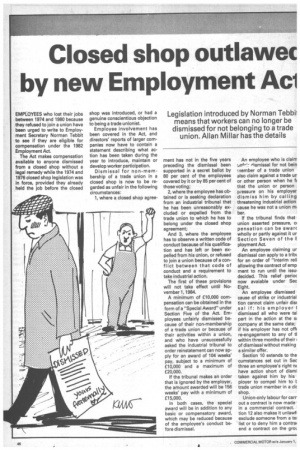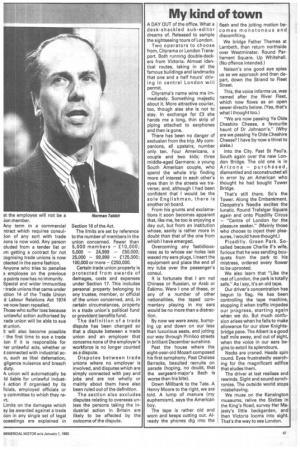Closed shop outlaw& by new Employment Adi
Page 48

Page 49

If you've noticed an error in this article please click here to report it so we can fix it.
Legislation introduced by Norman Tebbi. means that workers can no longer be dismissed for not belonging to a trade union. Allan Millar has the details
EMPLOYEES who lost their jobs between 1974 and 1980 because they refused to join a union have been urged to write to Employment Secretary Norman Tebbit to see if they are eligible for compensation under the 1982 Employment Act.
The Act makes compensation available to anyone dismissed from a closed shop without a legal remedy while the 1974 and 1976 closed shop legislation was in force, provided they already held the job before the closed shop was introduced, or had a genuine conscientious objection to being a trade unionist.
Employee involvement has been covered in the Act, and directors' reports of larger companies now have to contain a statement describing what action has been taken during the year to introduce, maintain or develop worker participation.
Dismissal for non-membership of a trade union in a closed shop is now to be regarded as unfair in the following circumstances:
1, where a closed shop agree
ment has not in the five years preceding the dismissal been supported in a secret ballot by 80 per cent of the employees covered by it or by 85 per cent of those voting; 2, where the employee has obtained or is seeking declaration from an industrial tribunal that he has been unreasonably excluded or expelled from the trade union to which he has to belong under the closed shop agreement; And 3, where the employee has to observe a written code of conduct because of his qualification and has left or been expelled from his union, or refused to join a union because of a confl ict between that code of conduct and a requirement to take industrial action.
The first of these provisions will not take effect until November 1, 1984.
A minimum of £10,000 compensation can be obtained in the form of a "Special Award" under Section Five of the Act. Employees unfairly dismissed because of their non-membership of a trade union or because of their activities within a union, and who have unsuccessfully asked the industrial tribunal to order reinstatement can now apply for an award of 104 weeks' pay, subject to a minimum of £10,000 and a maximum of £20,000.
If the tribunal makes an order that is ignored by the employer, the amount awarded will be 156 weeks' pay with a minimum of £15,000.
In both cases, the special award will be in addition to any basic or compensatory award, which may be reduced because of the employee's conduct before dismissal. An employee who is claim dismissal for not bein !nember of a trade union also claim against a trade ur or other person when he fl that the union or person pressure on his employer dismiss him by calling threatening industrial action cause he was not a union mi ber.
If the tribunal finds that union asserted pressure, ci pensation can be awarc wholly or partly against it ur Section Seven of the E ployment Act.
An employee claiming ur dismissal can apply to a tribt for an order of "interim reli allowing the contract of emp ment to run until the issu. decided. This relief perioc now avaiable under Sec Eight.
An employee dismissed cause of strike or industrial lion cannot claim unfair disi ,sal if: his employer I dismissed all who were tal part in the action at the Si company at the same date; if his employer has not offi re-engagement to any of ti within three months of their of dismissal without making a similar offer.
Section 10 extends to the cumstances set out in Sec three an employee's right n( have action short of dismi taken against him by his ployer to compel him to t trade union member in a cic shop.
Union-only labour for carr out a contract is now made in a commercial contract. lion 12 also makes it unlawf exclude someone from a tei list or to deny him a contrai end a contract on the grot at the employee will not be a lion member.
Any term in a commercial ntract which requires consul:ion of any sort with trade lions is now void. Any person chided from a tender list or )m getting a contract for not ognising trade unions is now otected in the same fashion. Anyone who tries to penalise a employee on the previous o points now has no immunity. Special and wider immunities trade unions that came under !ction 14 of the Trade Union d Labour Relations Act 1974 ve now been repealed.
Those who suffer loss because unlawful action authorised by :rade union will be able to sue at union.
It will also become possible r the first time to sue a trade lion if it is responsible for ner unlawful acts, whether or I connected with industrial acin, such as libel defamation, gligence nuisance and breach duty.
A union will automatically be Id liable for unlawful indust11 action if organised by its ficials, employed officials or y committee to which they rein.
Limits on the damages which ay be awarded against a trade lion in any single set of legal oceedings are explained in Section 16 of the Act.
The limits are set by reference to the number of members in the union concerned. Fewer than 5,000 members — £10,000; 5,000 — 24,999 — £50,000; 25,000 — 99,999 — £125,000; 100,000 or more — £250,000.
Certain trade union property is protected from awards of damages, costs and expenses under Section 17. This includes personal property belonging to any trustee, member, or official of the union concerned, and, in certain circumstances, property in a trade union's political fund or provident benefits fund.
The definition of a trade dispute has been changed so that a dispute between a trade union and an employer that concerns none of the employer's workforce is no longer counted as a dispute.
Disputes between trade unions where no employer is involved, and disputes which are simply connected with pay and jobs and are not wholly or mainly about them have also been ruled out of the definition.
The section also excludes disputes relating to overseas unless the persons taking the industrial action in Britain are likely to be affected by the outcome of the dispute.
















































































